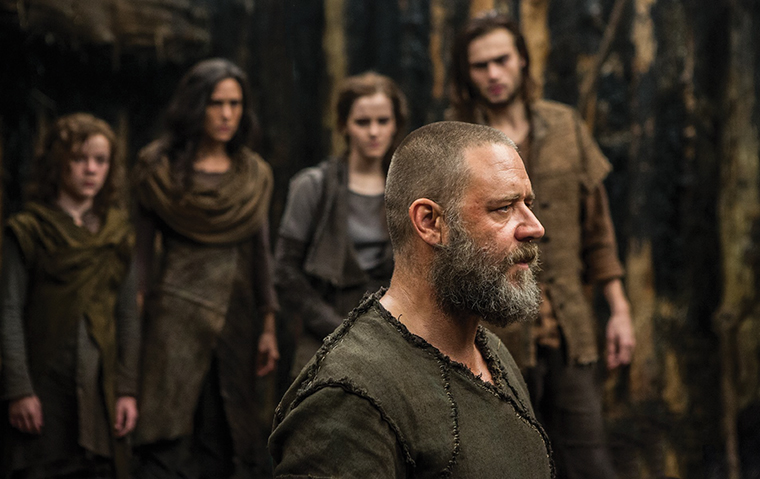‘Noah’ rocks the boat, nearly capsizes
Noah
April 7, 2014
Director Darren Aronofsky (“Black Swan,” Requiem for a Dream”) has taken on a subject rife with controversy for his first big-budget blockbuster “Noah.” A biblical epic is a risky project, and religion a divisive subject. However, the film’s deliberate visual contrast of food and evil resonates with the loosely adapted narrative and, despite its faults, beautifully illustrates the duality of human nature and its potential for both love and hate.
“Noah” follows the title’s Bible story at a cursory level, telling the tale of mankind’s ark-building savior, Noah (Russell Crowe), who is chosen by God to save the animals on Earth by building an ark to survive a great flood conjured by God to cleanse the world of humanity’s irredeemable sin.
The film’s loose interpretation of the scriptural text has many Christians justifiably upset. While some changes are minor, such as Noah receiving his instruction through dreams rather than from God himself, other changes are odd and exists only to set the screen version apart. The rock monsters sent by God to help Noah build and defend the ark are laughably strange. In addition, Noah turns maniacal toward the final third of the film, believing that all vestiges of mankind, including his family, must be eliminated from the Earth. The touches are sometimes successful, as in the case of the visual metaphors of Noah’s dreams, but Noah’s brooding transformation is needlessly confusing and sacrifices character development for suspense.
“Noah” weaves a universal tale of corruption and redemption through the personal narrative of one family facing impending doom. Noah, along with his wife Naameh, played by Jennifer Connelly (“A Beautiful Mind,” “Requiem for a Dream”), his three songs—Shem, Ham, and Japheth—and adopted daughter, Ila (Emma Watson), are shown in several early scenes to establish their close-knit relationship. Noah even defends his family from a group of malicious vagrants, killing them mercilessly. In a corrupt world, his family is the last example of the good in humanity.
“Noah” shifts between God’s miracles and brutally graphic displays of wickedness. The scenes where the Earth’s animals gather together are majestic and intimidating, with sweeping shots and computer-generated imagery that accentuate the scope of God’s power. That beauty is juxtaposed with horrific and disturbing images of death and violence, depicting a graphic apocalypse that will not disappoint the imagination.
In one well-shot scene, Noah stumbles into a camp led by the antagonistic king Tubal-cain (Ray Winstone), a reference to the biblical Cain who introduced murder on Earth by killing his brother Abel. The disgusting scene depicts rape and mutilation of animals.
When the flood finally comes, Noah and his family sit safely around a fire in the ark, as the chilling last screams of the dying echo outside.
The supporting cast and their narratives bog down the film. In particular, Noah’s son Ham, played by Logan Lerman (“Gamer,” “Percy Jackson & the Olympians: The Lightning Thief”) is the stereotypical whiny teenager probably more at home in a Lifetime TV movie than a biblical epic. He witnesses the power of God first-hand when Noah plants a seed and a forest grows instantly, yet Ham is only concerned with finding a wife before the flood. He begrudges his father throughout the film for denying him said booty call, even going so far as to plot his murder with Tubal-cain. His motivations are inconsistent to the point of idiocy. The writing makes him both unpredictably stupid and predictably one-dimensional.
Noah’s attempt to both protect his family and serve God is handled with care during the first half of the film. Crowe’s nuanced portrayal of the gruff but caring Noah is one of his best performances in years. For him, the writing remarkable. There are almost no wasted words from Noah, and the dynamic between Crowe and Connelly is believable in a way marriages are rarely depicted in historical dramas. Even when the two say nothing, a subtle glance or touch displays understanding and love, making Naameh’s shock at noah’s sudden change toward the end of the film all the more poignant.
Yet, the treatment of Noah’s character near the end of the film is baffling. While he is heroic in the beginning, he becomes homicidal once faced with the possibility o a pregnant Ila. His assumption that God wants him to kill infants is strange and sudden, but shows that even the righteous falter. His subsequent refusal to kill the newborn twins out of love for people and his family completes his salvation.
“Noah” successfully uses a biblical tale to focus on a universal story or morality and family. While the film’s narrative execution sometimes falters, the message that the consequences of arrogance can be redeemed through love does not.








